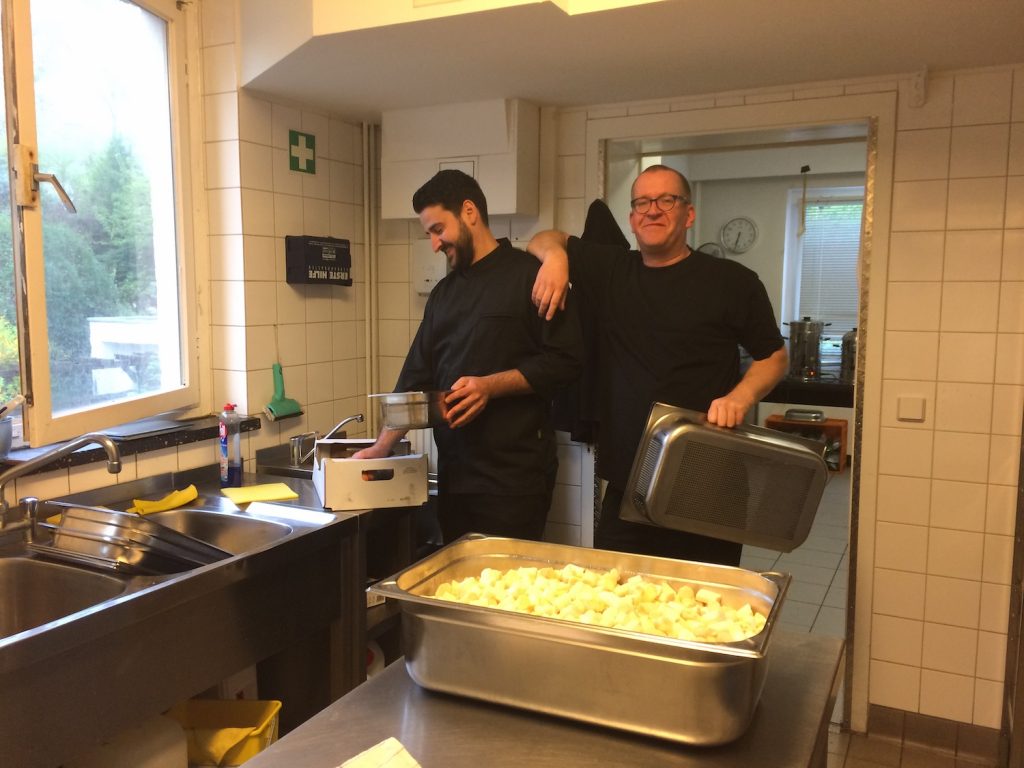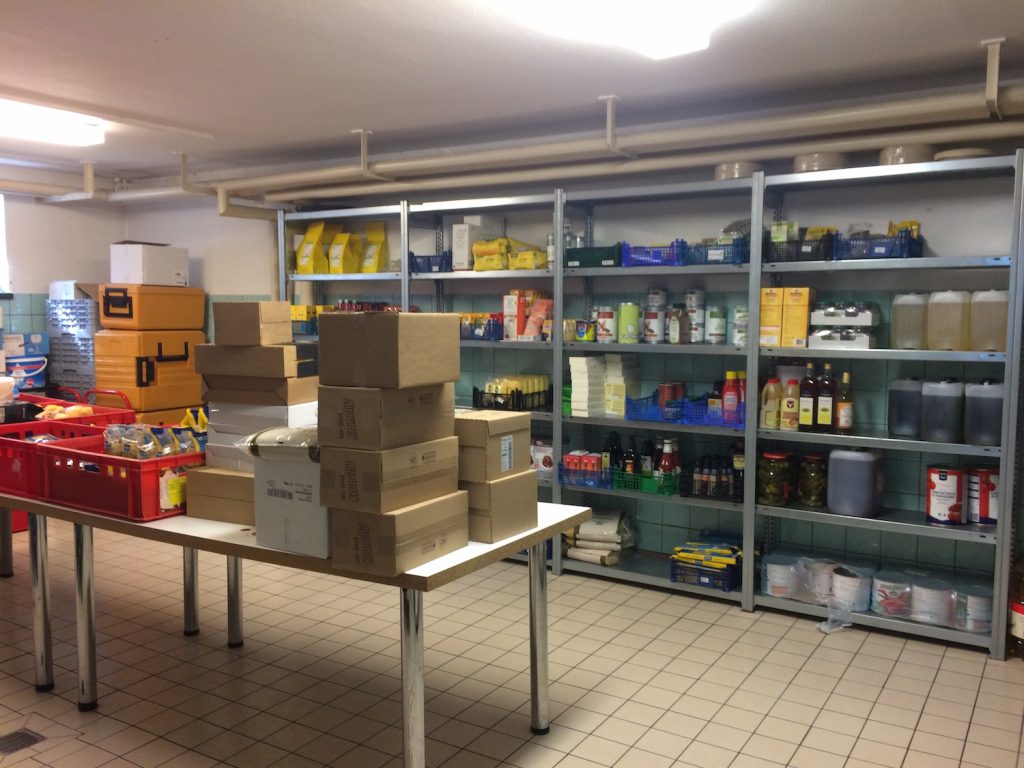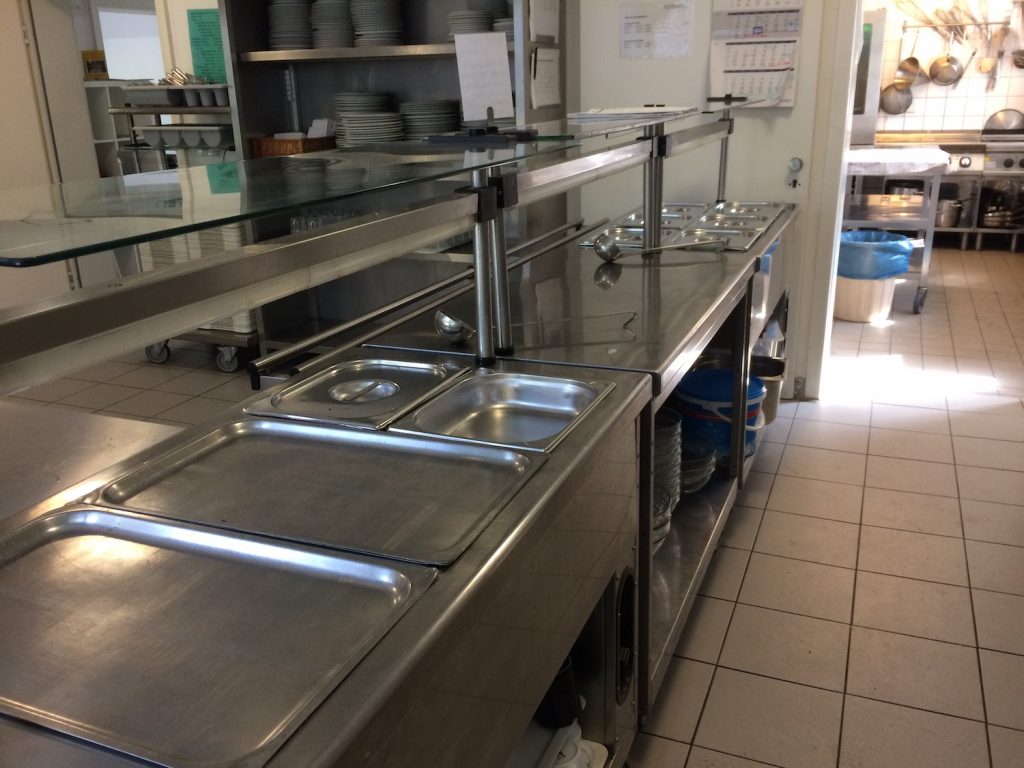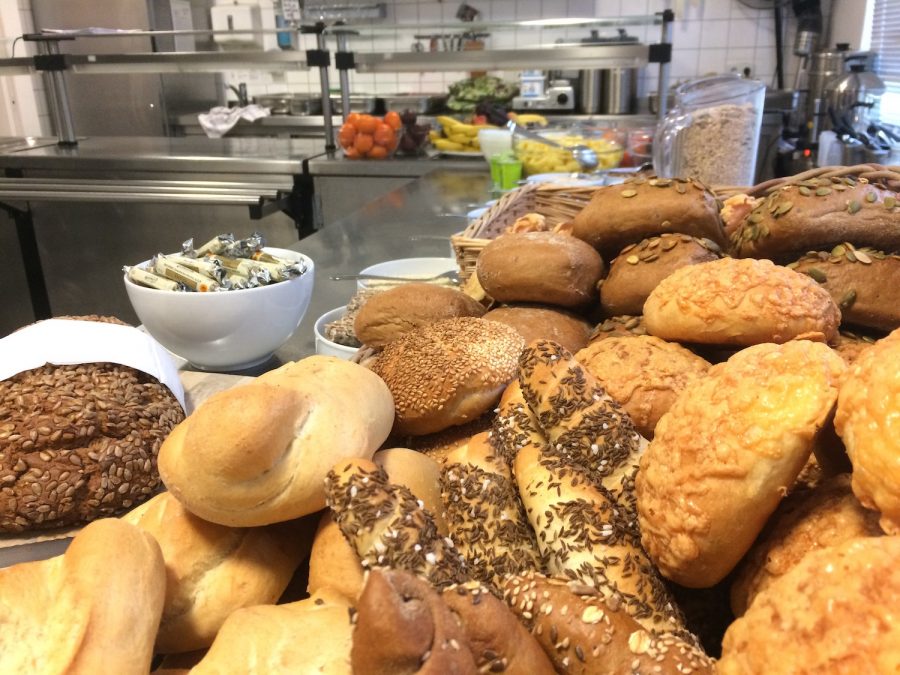I think it is not something intuitive to turn one’s special attention and appreciation to the goods one receives daily. However, I think herein lies one of the keys to a mindful and content life — in just looking around and acknowledging the amount of resources, work, and time it takes to enjoy things on a daily basis. One of the goods we enjoy at Bard College Berlin is the fresh food we are served at the cafeteria. I joined the cafeteria staff on a Wednesday this past semester for part of the day to see how they prepare meals for hundreds of students and staff members every day.
It is 6:30 am. I walk into the cafeteria, and breakfast is already almost fully prepared. Only the products that need to be freshly served, such as cold cuts and cheese, are missing. I walk outside and see Philipp and Mergim, two of the four cooks at our school, sitting by the garden table. Their day at the cafeteria started at 5 am already. They greet me in a friendly manner, and, for now, the peaceful silence of the morning hour prevails. We don’t sit too long, though, because they still have to go back to work and prepare lunch for today Several kilos of noodles, 15 kg of potatoes, 15kg of asparagus, 15kg of carrots, 5kg of leek, 8kg of fish, and 75 liters of broth are waiting to be transformed into a delicious soup for over 200 people. Wednesday is always soup day.
I am excited that the cooks trust me enough to let me help them. While Mergim starts to cut the salad, Philipp prepares the pancakes for breakfast and continues with preparations for lunch and dinner. During this time, I happily peel the potatoes that are to be used for the soup. I roughly count 100 of them and need around an hour to finish them all. This task was the first step in appreciating the amount of food that is prepared daily in this not-too-big kitchen with only 4 workers. Only two are working during the shift before the other two, Philippe and Evelyn, join them around midday to continue working until 8 pm.

Mergim describes the staff’s working days as follows: At 5 am, they start preparing breakfast, take stock of the fridge, get the products out of the basement, clean and clear the storage, and cook for lunch and dinner. In the evening, they prepare parts of the breakfast that don’t have to be served fresh. They also work on the weekend, in alternating shifts, mostly to make brunch. Throughout the morning, I never see them standing still: they are constantly in movement, doing something — cutting, cleaning, mixing, lifting plates, going up and down to the storeroom.
But who are the people that cook for us every day?
I had a chance to interview them and ask why they chose this path in gastronomy. I spoke to Evelyn (from Germany), Mergim (from Kosovo), Philipp (from Germany), and Philippe (from France).
Evelyn
Evelyn began her work at Bard College Berlin seven years ago after Peter the gardener informed her about the job vacancy. As a child, she was raised in a large family and had to learn how to cook early. She says that she enjoys her work and does it with passion. To her, it is important that the students can enjoy their break with tasty food, replenish their strength, and talk to their fellow students.
Evelyn wishes that students would bring their dishes and trays back to the shelf trolleys, and the spices back to their original place as she believes these small actions reflect respect for the cafeteria team. Otherwise, the staff and workers have to go around, even to the garden, to collect them. Good words from the students about the food make her and the rest of the cafeteria team happy, and, at the same time, constructive criticism is welcomed.
Philipp
Philipp was originally hired as a temporary worker at our college, but the result has been rather more permanent than initially expected. He has been part of the kitchen staff for eight years. As a child, he did his homework next to cooking pots because his father was a master baker. He knew he wanted to do something with his hands; he thought of becoming a carpenter, but ultimately decided to be a cook.
Mergim
Mergim started working at BCB around 8 months ago. As a youth after school, he always helped his uncle out in his restaurant, and he really enjoyed the work. He also has office work experience , but he did not like this type of work because he likes to stay active. His advice to young people is to try out everything and see what one likes because life is too short.
Philippe
When I interview Philippe, I am impressed and shocked at the same time. He has been in gastronomy since the age of 15 and has worked in several other restaurants as the head cook before he came to Bard College Berlin four years ago. At other places, he used to work 80 hours per week, sometimes 100 hours or even more than 100 hours. When he sees my shock and surprise, he answers that this is normal in the field of gastronomy.

Now, work goes on. After I finish peeling the potatoes and cutting the cucumbers and tomatoes for the salad — it must be around 9 or 10 am— Mergim and I go downstairs to unpack the deliveries and arrange them in the different storerooms. I observe what he is doing and try to help out as much as possible. There are several storerooms in the basement: a Gemüselager (vegetable storage), Trockenlager (dry storage) and Kühllager (cold storage). The cafeteria has 6 different suppliers that deliver fresh products daily, sometimes even several times a day.
Seeing all the products in the storage area makes me realize how dependent human beings are on food and how many types of food they need on a daily basis to survive and live healthily. We are only a small university in Pankow, but think about all other households in Pankow, in Berlin, in other cities, in Germany, in other nations, around the whole world. We need unimaginable amounts of food and water to sustain ourselves on a daily basis. Imagine what the storeroom of the world would look like. I can’t. Sometimes, I try to count the rice grains on one spoon or plate to remind myself of this blessing and wonder of the world’s provision. Besides the human work to process the food, there is time, rain, light and earth needed to bring life to what brings us life.
Upstairs, I get to know one of the student workers who starts her morning shift. There are 10 student workers that alternately start at 10 am in the morning and work in different shifts, mainly to help out the cafeteria staff by cleaning the dishes and trays. I had the chance to interview one of them, Jessie (BA 2021) about her work in the cafeteria:
“As part of the team, I get to have more interactions with the staff members than I otherwise would (also free German practice). During shifts, especially lunches, you have to be quick, or else the trays keep piling. You also have to be careful and notice which piece of cutlery is not clean enough. That’s why I think that contrary to the perception of this being an ‘unskilled job,’ the cafeteria assistant job is one that requires many skills, like coordination and organization.”
When I ask her about special experiences, impressions, thoughts or comments she would like to share about the cafeteria, she answers:
“Students in the cafeteria team are really helpful: we always trade shifts with each other or we just take them for those who can’t come. As for the staff, I have the impression that they really want to make the cafeteria a better place for our dining experience. They often get misunderstood by students, though. This is probably due to the language barrier, but they actually joke a lot, just like we do with our friends! Dinner shifts always end at 8, and I didn’t know when the staff starts work until the time when I accidentally got trapped in the cafeteria building for a night and I saw the staff members coming over at 5am to prepare meals. It is reasonable that they get tired and impatient sometimes since they have a big physical workload over long hours.”
Besides hearing a student’s experience with the cafeteria staff, I was curious to know about the cooks’ experience with the students. When I ask Mergim how he perceives the students, he answers “friendly.” Generally lovely, friendly and nice. There are some who say hello, and some who don’t. There are also some that take 4 or 5 instead of one napkin or take more than they can eat so that, at the end of the day, the food that remains on the plates amounts to 1/5-1/6 of what is made, according to the cafeteria staff. He says it would help if people just tried a little bit of what they don’t know or stood up to ask for food more than one time in order to prevent food waste.
Not long ago, after an email was sent around to the Bard College Berlin community by a student who was concerned with how much food got thrown away, a productive meeting took place upstairs in the cafeteria to discuss possibilities to reduce food waste. Students, members of the Student Life team, the Civic Engagement Manager, and faculty were present to think about easy and practical ways to consume the food more responsibly. One of the outcomes of the meeting was to make posters to remind people to be more mindful with their portion sizes. Jessie, who was present at this meeting, mentioned how stale bread is collected and transported to an animal farm. Afterwards, I asked her what exactly happens to the food that is left over, and she answered:
”I was told that all the bread goes to a bunny farm — we store the leftover bread in a clean trash bag at the end of the day. For the salads and other produce, we have to throw them into the bio box if they get too old. If they are still fresh, they are stored in the fridges after dinner time and reused in other foods. The cake and desserts, due to the sugar they contain, couldn’t be there for too long, so they also go into the bio box unless we (the workers) take some home. I also occasionally see that people leave untouched fruits and unopened sugar/butter packs on their trays when they are returned. In this case I put them back where they came from. Putting them back before returning the trays is not that difficult.”
Jessie explains how possibilities to reduce the leftover food on the trays are discussed. One possibility is that students take only what they need by serving themselves since they often feel the cafeteria staff gives them more than they need. A counterargument is that people tend to take more than they need if they serve themselves and thus leave food on their plates that must be thrown out. According to Jessie, it is sometimes difficult to estimate how many people will show up for lunch. This uncertainty explains why too much food can be left over in the kitchen: sometimes the number is overestimated.
Jessie’s answer shows that there are already efforts to deal with the leftover food responsibly, either by reusing it in other meals or sending it to an animal farm. Her answer also shows how difficult it is to estimate how much food is needed and that, with either self-service or serving staff, there are challenges that start with individual actions. Here, I think, effective communication is imperative to reducing food waste that comes from taking portions that are too big: we must ask for less if we feel that we will be given too much. Taking only as much food as one is able to eat would help to reduce the amount that is left over on our plates. It is also important to realize that it is definitely not in the interest of the cafeteria staff that food is left over which is thrown away, neither in the serving trays nor as unserved meals. Though unserved meals can still be reused contrary to food that remains on the trays, the community must still think about methods to distribute the remaining food — perhaps letting students take food home could be one of those methods. There is a need to collectively continue efforts for the responsible reuse of leftover food in the coming semester.

What I have learnt in my few hours at the cafeteria is that being a cook is a tough job that requires a great amount of effort, preparation and calculation to cook delicious meals and to distribute all the food to the students. It is nearly 11 a.m. when the cooks finish lunch and Mergim says “Fertig!”
“You prepare the food for such a long time and it disappears in 2 hours.” Philipp says in wonder.
Through shadowing the cafeteria staff, I learn that cooking is a creative process and the end product is beautiful to look at.
“I draw a new picture every day,“ Philipp says.

